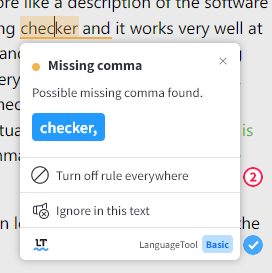While I dearly love the Firefox browser and think everyone should use it instead of helping Google dominate and bend the web to its will by using Chrome, I did find its built-in spelling checker to be just erratic enough in reliability that I began searching for alternatives. One of the weird things the built-in spelling checker would randomly do is start flagging every word as wrong, so you’d get paragraphs of words with squiggly red underlines beneath them. For someone who likes to keep things (relatively) tidy, it drove me batty.
In recent years, grammar/style checkers have come into vogue, with all of them pretty much following the same model:
- Plugins for all major browsers
- Basic features like spelling checker free to use
- Premium features like style checking requiring a subscription
- Subscription prices being on the edge of “lol no” territory
I tried Grammarly, which is easily the best-promoted of the bunch, and ProWritingAid. Both were fine but not quite right for various niggling reasons that I’ve since forgotten. Maybe they nagged too often to upgrade to the subscription or something.
Another one I tried is the plain-named LanguageTool, which sounds more like a description of the software before it gets a spicy, memorable name. All I needed was a good spelling checker and it works very well at this part. Better yet for me, it works with a single left-click on the word and presents a very nice-looking pop-up with the correct spelling ready to be clicked on pretty much every time. Yay. Now, LT (as I call it, now that we’ve established a relationship), also offers basic grammar checking for free, so I’ve left it on, figuring it couldn’t hurt, could it? Depending on who you ask, it can, actually! See the video Grammarly is Garbage, and Here’s Why as just one example (I’m not picking on Grammarly specifically, this is just the most recent video of its type that I’ve seen).
What I have discovered about LT’s grammar checker is this: It is madly in love with commas, as seen in the screenshot below.

Its comma rule can be summed up as:
If you use the word 'and' it must be preceded by a comma OR THE WORLD AS WE KNOW IT MAY END
In some cases it’s right, in others it’s weird and in a few, it’s flat-out wrong, like this one, which demands a comma be added after ‘pretty’:

Adding a comma after ‘pretty’ would seem to make sense, because ‘it’s pretty’ is a complete, if short, thought. But in the context of the sentence it’s a silly suggestion because the sentence is so short, no one is going to get confused by not having a pause after ‘pretty’ and wonder what the heck is going on.
Now, I do have the option to Turn off rule everywhere (see screenshot below), which would presumably eliminate it flagging missing commas even when sentences are crying out desperately for them. And part of me really wants to do that. But commas are also kind of my bane, and I do often leave them out when they should be in–or sprinkle them too liberally. Basically, commas make me crazy. So the rule stays. For now.

In conclusion, is Esperanto better than English? Should we all be switching to it? Practice our telepathy for better, clearer communication? Lobby the grammar authorities to just eliminate the comma entirely? So many options.
Also, apologies for my whimsical use/misuse of double and single quotation marks. LanguageTool doesn’t flag those.